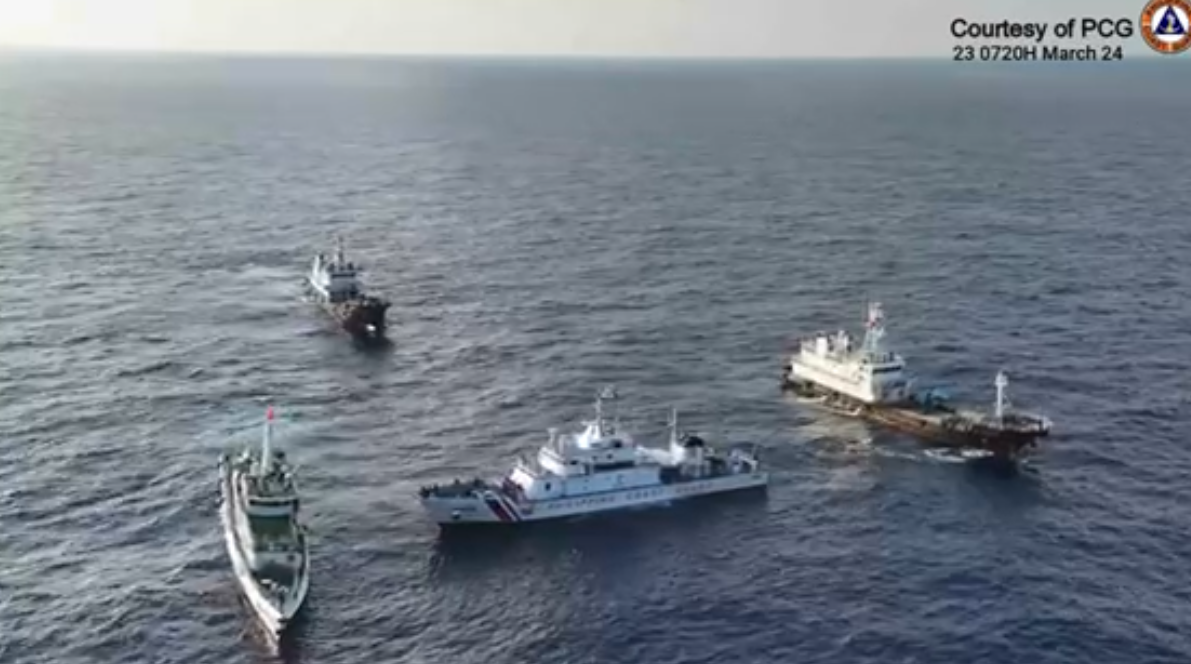PCG vows continued presence in West Philippine Sea following Marcos order

The Philippine Coast Guard (PCG) on Sunday said that it will continue to have its presence seen in the West Philippine Sea, at the same time maintain peace in the area, amid China’s aggressive moves against Philippine vessels.
PCG spokesperson Rear Admiral Armand Balilo said that this was in line with the order of President Ferdinand “Bongbong” Marcos Jr. to have several government agencies strengthen the country's maritime security and maritime domain awareness amid "serious challenges" threatening the Philippines' territorial integrity and the “peaceful existence of Filipinos.”
“Sa kabila ng mga naranasan nating mga panggigipit sa 'tin ng China Coast Guard at 'yung mga nangyaring incidents, nananatili ang mga tauhan natin na tapat sa kanilang tungkulin na ipagpatuloy 'yung utos ng ating pamahalaan na ilagay 'yung presensya natin doon sa West Philippine Sea at 'wag magpatinag doon sa nangyayari,” Balilo said in a Super Radyo dzBB interview.
(Despite the aggression we experience from the China Coast Guard and the incidents that have happened, our personnel remain faithful to their duty to follow the order of the government to put our presence in the West Philippine Sea and to not get swayed by what has been happening.)
“Subalit ang kailangan lamang dito ay ‘yung attitude nila, tignan na dapat ang kapayapaan ang panatiliin at 'wag pumatol doon sa ginagawa ng China sa West Philippine Sea,” he added.
(What is needed here is our personnel’s attitude, to be able to see that peace should be maintained and to not retaliate at China for what it is doing in the West Philippine Sea.)
Under Executive Order No. 57, the National Coast Watch Council has been renamed and reorganized into the National Maritime Council (NMC) chaired by Executive Secretary Lucas Bersamin.
The NMC will be responsible for formulating policies and strategies to ensure a unified, coordinated, and effective governance framework for the country’s maritime security and domain awareness, among other powers and functions.
Balilo said that with this council, they will be able to “step up” their operations in other areas aside from Ayungin Shoal where the BRP Sierra Madre is grounded and rotation and resupply missions usually take place.
“More or less, ‘yung magiging trabaho niyan ay pareho. Siguro dahil lamang sa incident, baka i-step up ang ating mga operations, lalo na ang ating maritime domain awareness. Maaaring hindi lamang doon sa area ng Ayungin kung saan laging may gulo. Baka sa other areas pa, kasama ang Bajo de Masinloc,” he said.
(More or less, our job will still be the same. Maybe because of the incident, we might step up our operations, especially our maritime domain awareness, not only in the Ayungin area where there is always trouble, but in other areas as well, including Bajo de Masinloc.)
On March 23, the Armed Forces of the Philippines (AFP) reported that the China Coast Guard again performed a dangerous maneuver against a Philippine vessel. The PCG said that one of its vessels, which was part of the mission, was “impeded and encircled” by Chinese vessels.
Three navy personnel were injured due to the incident, according to National Security Adviser Eduardo Año.
China Coast Guard ships also used water cannons on a Philippine vessel, the Unaizah May 4, carrying supplies for Filipino troops stationed at the BRP Sierra Madre in Ayungin Shoal in the West Philippine Sea. —KG, GMA Integrated News




